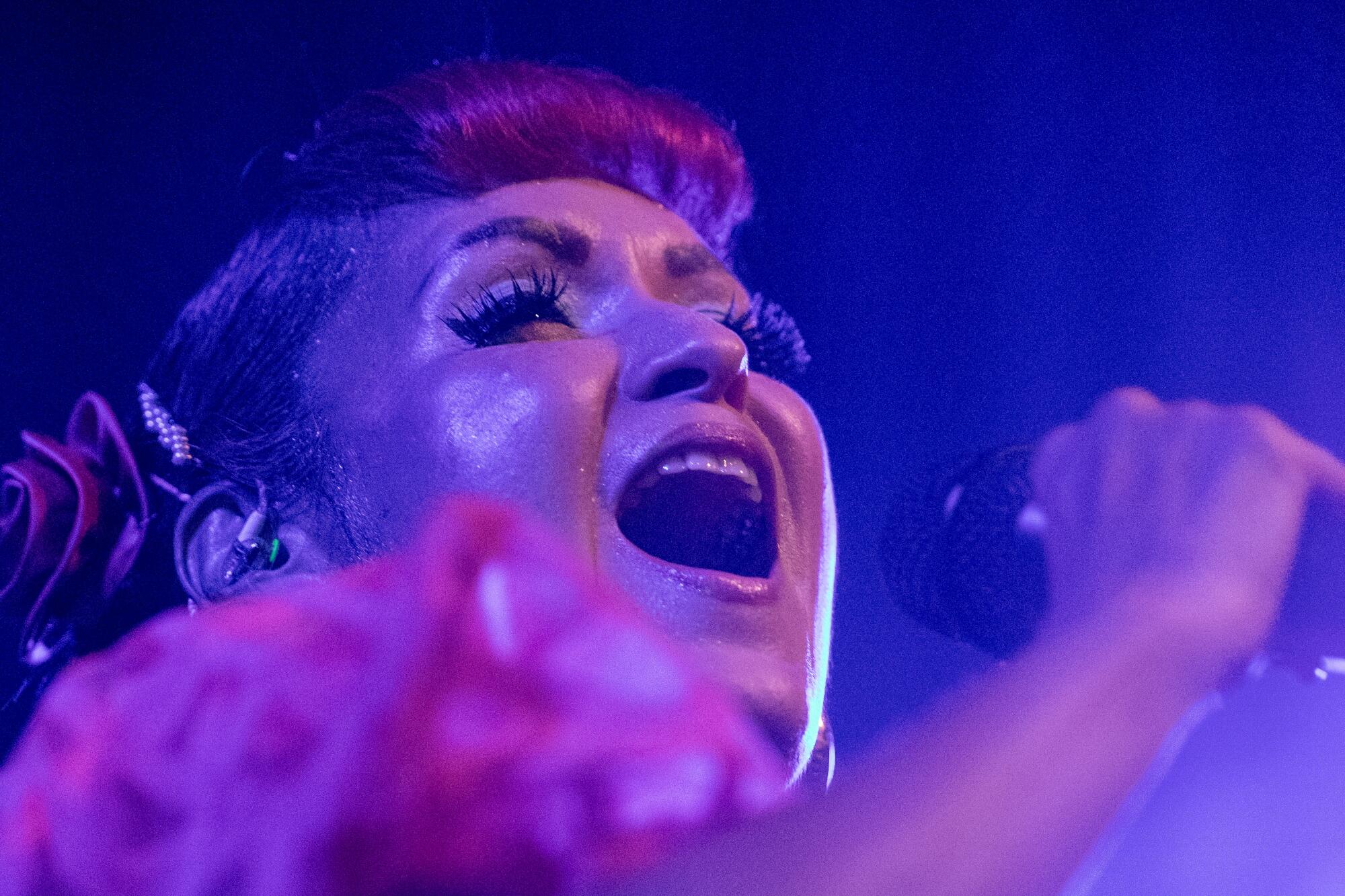Las Cafeteras members Hector Flores and Denise Carlos spent their adolescences chasing the dreams of their immigrant parents. After attending college, they were expected to get married, start families and lead simple lives.
Instead, they formed Las Cafeteras, an East Los Angeles-based protest band and dedicated their lives to activism through music.
“I had to keep explaining [to my parents] why it was so meaningful that I do music. I would get frustrated and ask ‘Why don’t you have bigger dreams for me?,’” said Carlos. “For them, buying a house and having a pension was a big enough dream. I always say they gave me the audacity to dream bigger.”
Despite being an eight-part folk band for more than a decade, the group didn’t start with the intention of making music. Members’ initial priority was to shed light on such issues as immigration and women’s and LGBTQ+ rights.
Now, on their newest album, “A Night in Nepantla,” released in May, they finally claim the title of musicians. Creating their “most honest album yet,” they say the nine-track album is an accurate representation of who they are today.
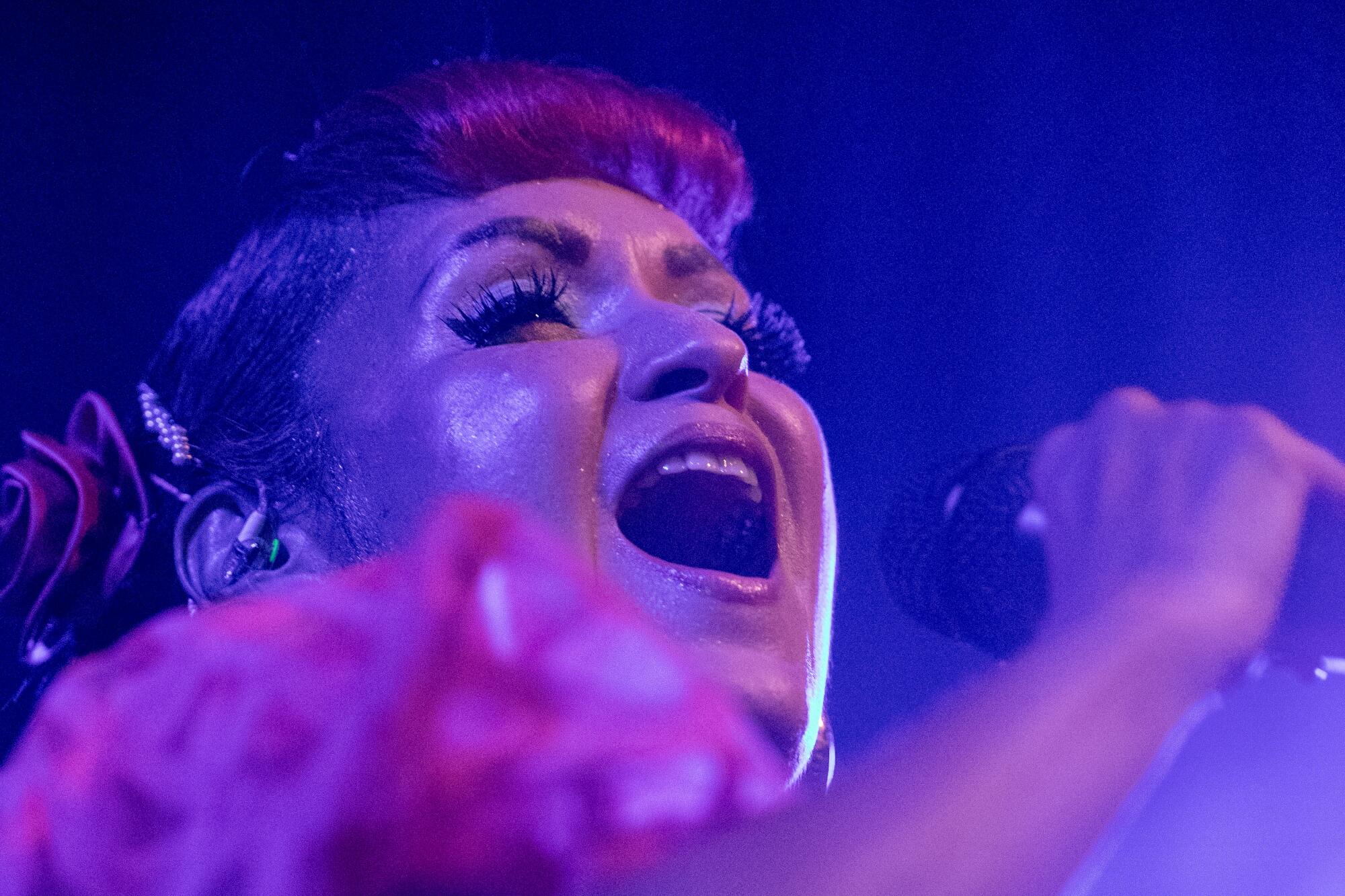
Denis Carlos of Las Cafeteras sings at the Paramount in Boyle Heights.
(Zoe Cranfill / Los Angeles Times)
“With [‘A Night in Nepantla’], we found a really beautiful place of accepting ourselves,” said Flores. “I’ve always wanted to make this music, but I didn’t know how.”
Formed by college students in the early 2000s, the band has seen many lives and members since then; singers and jarana players Flores, Carlos and drummer Jose Guadalupe Cruz Cano are the last original members. Additionally, they are joined on tour by bassist Moises Baqueiro, keyboardist Jesus Gonzalez, singer Alih Jay de Peña and Pok’ok Mijangos, who plays the requinto jarocho.
“We realized early on that protesting doesn’t always have to be at a march or a rally,” Flores said. “Music can be inviting to everybody.”
Flores and Carlos first met in 2003 at a Movimiento Estudiantil Chicano de Aztlán (MEChA) leadership conference at Cal State Long Beach. At the time, they were both heavily involved in organizing protests for the Cal State system. Their friendship and shared interests continued to grow at East Side Cafe, a volunteer-run community hub where the band officially came to fruition in 2010.
“We started learning how to play music together, how to sing together, dance together and finally write together,” Flores said. “If we’re going to survive, we gotta tell our story.”
Over the years, the group has released three full-length albums — “It’s Time,” “Tastes Like L.A.” and their new one. On their first two projects, they stayed well within the bounds of traditional Latino folk music — telling stories of luchadores and rebellion over guitar-powered tracks. On their third record, however, they welcome a new balance between their sonic creativity and political efforts.
In an effort to break out of their comfort zone, members decided to emphasize dance beats on “A Night in Nepantla.” Tracks like the bassy club-pop “Tia Lucha” and the electronic-infused ode to Mother Earth “Morena Morena” showcase the band’s upbeat abilities.
“If you listen to who we were before the pandemic and after the pandemic, we are a totally different band, sonically, instrumentally and electronically,” Flores said. “There’s a new sense of brown futurism.”
Even while they embraced this newfound feeling, they couldn’t forgo their folk style of storytelling. In the album’s title, they refer to “Nepantla,” which comes from a Nahuatl word meaning “in-between” or “in the middle.” As children of immigrants growing up in America, they turned to this familiar concept as the basis for the record.
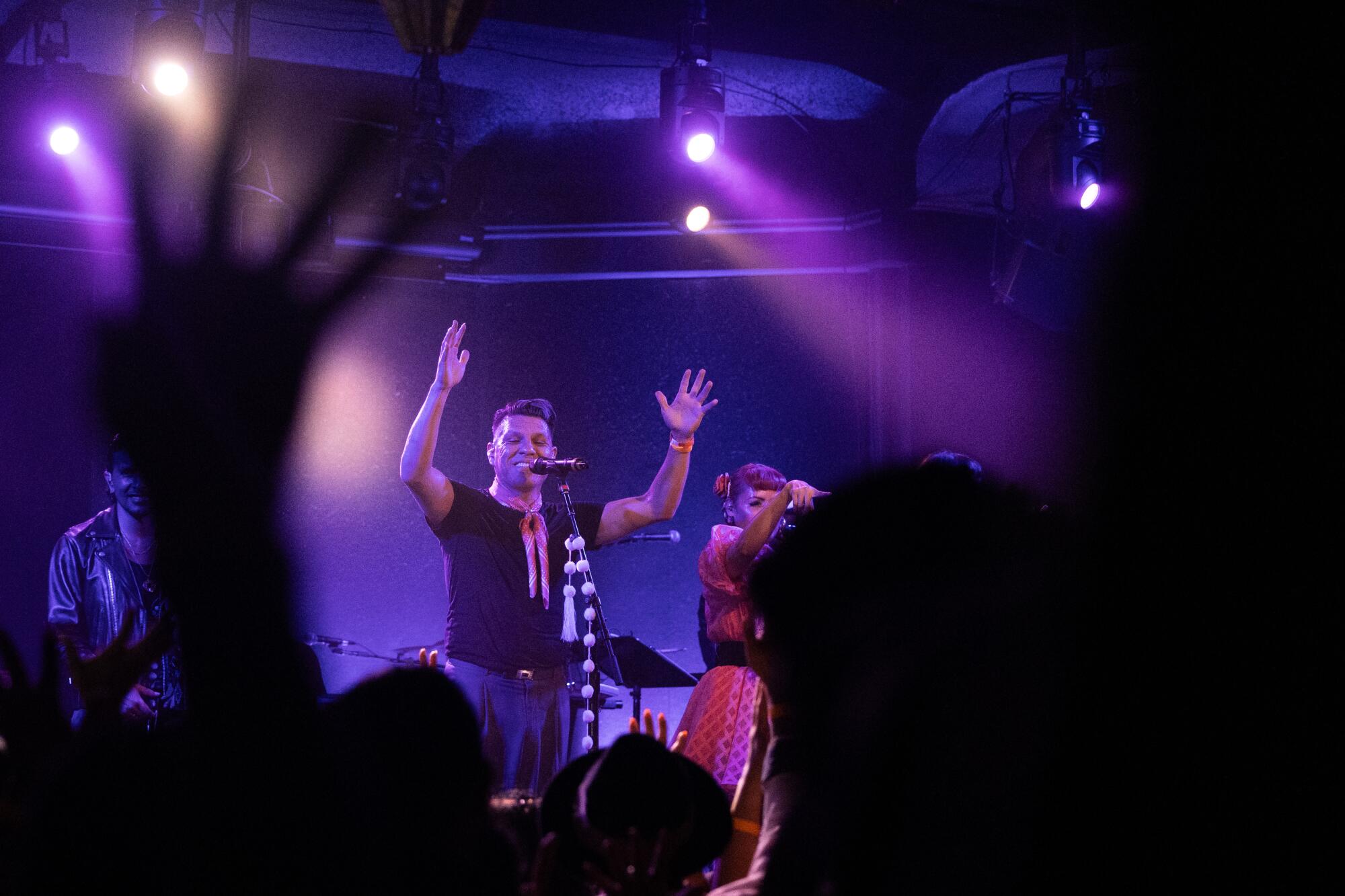
Las Cafeteras perform to a sold-out crowd.
(Zoe Cranfill / Los Angeles Times)
“It’s where you’re not at your destination yet and you’re almost lost,” said Carlos. “I always felt like I didn’t belong as a Chicana or as a woman. It’s always you’re not Mexican enough, you’re not white enough or you’re not American enough.”
Using this sentiment as a thread allowed group members to touch on both personal experiences and those of the larger community. On songs like “Cumbia De Mi Barrio,” a fusion of Peruvian Huayno-style cumbia and electro-pop, they share feel-good memories tied to their “barrio,” while on the synth-powered “Vivas Nos Queremos,” they call attention to the many missing and slain Indigenous, Latina and trans women who have never been found.
“Our music and shows are like an activation. It’s a protest. It’s a f—ing rally.. It will make you feel like we can change the world together,” Flores said. “If it can happen on the dance floor. It can happen out there.”
Marked by a record release show at the Paramount in August, the band brought the new sound back to its home in East L.A. As members of Las Cafeteras hit the 100-year old stage, adorned in color-coordinated bandannas and ribbons, the room’s energy shifted.
Young girls were hoisted onto their fathers’ shoulders, and multi-generational families shuffled through the sold-out crowd. The bandmates sang songs from their catalog as well as revamped covers of classics such as “La Guacamaya” and “La Bamba,” where they changed the lyrics to reflect their politics.
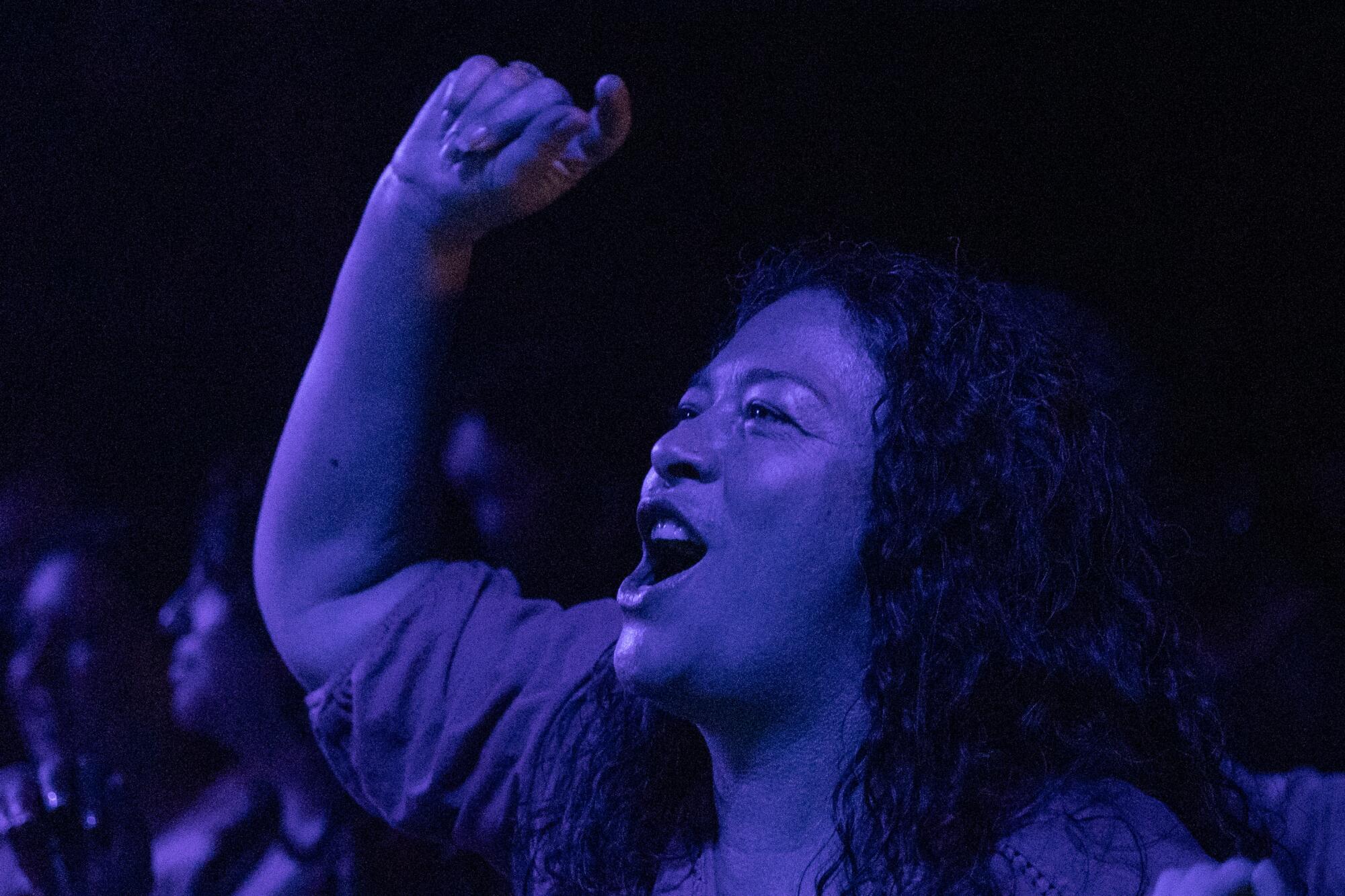
Fans of Las Cafeteras join the band by singing along to their favorite songs during a summer show at the Paramount.
(Zoe Cranfill / Los Angeles Times)
“That was our parents’ music, but it’s also our music. I identify with it more, and I take more pride in it,” said Diana Guzman, 42, a fan of Las Cafeteras who attended the L.A. show. “Someone can bring their kids, I can bring my parents and we can all relate to it.”
At the Boyle Heights gig, the band members took command of the stage, with Carlos and Flores in the middle. In between each song, they would share words of motivation. Flores told the crowd, “We are going to change the world one show at a time, but before we change the world together, let’s dance together.”
During songs like “La Sirena,” a rhythmic lullaby inspired by a drag queen, and the guitar-centric “El Chuchumbe,” small circles began to form in the crowd where anyone could join in and move to the beat.
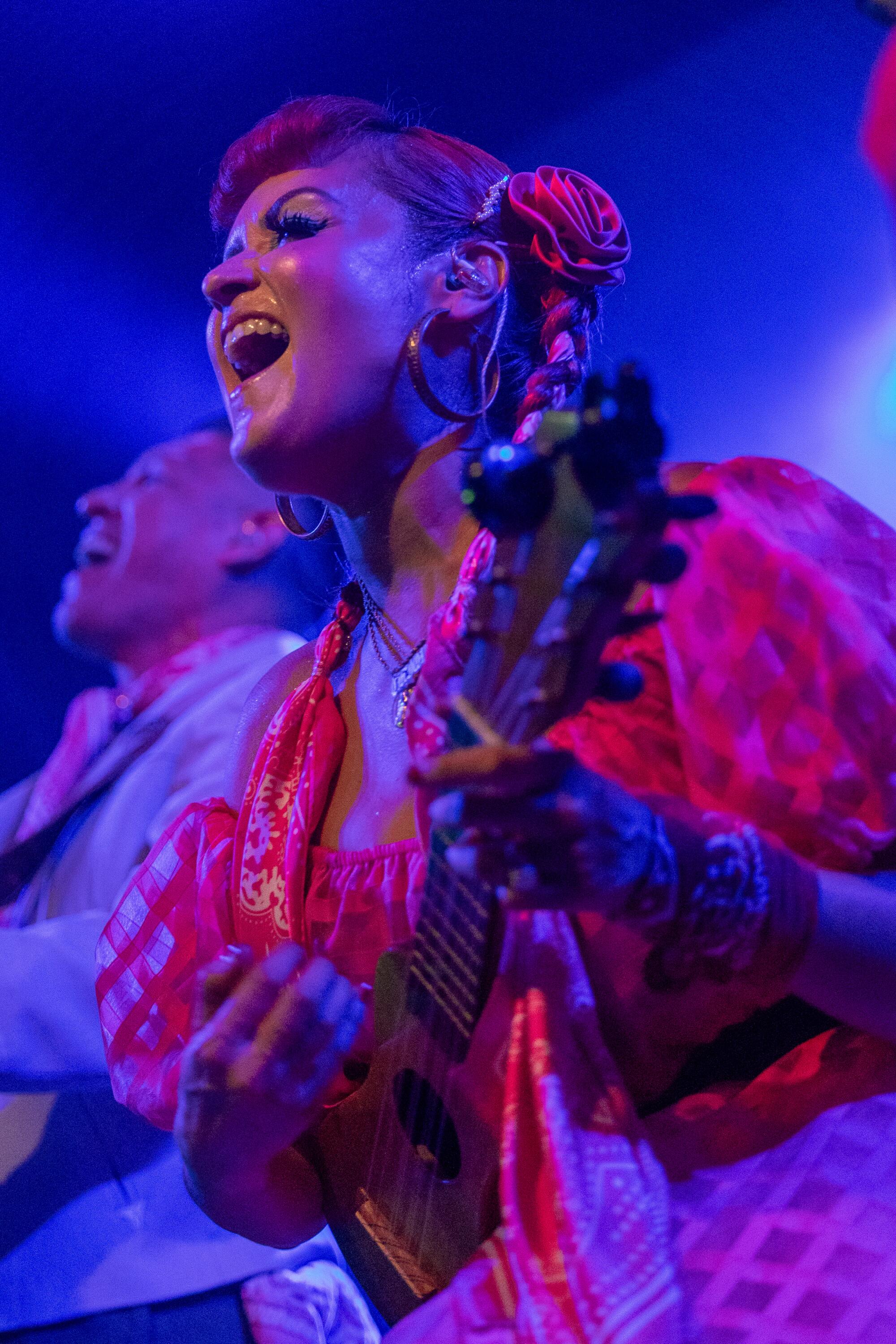
Denise Carlos of Las Cafeteras plays the jarana primera during the East L.A. band’s album release show.
(Zoe Cranfill / Los Angeles Times)
The crowd chants “otra,” and the band comes back for an encore. Flores dedicates the next song to all the “racists, the bigots and sexists who wanna take us back, and we ain’t going back.”
The familiar opening of Kendrick Lamar’s “Not Like Us” begins, but before the beat drops, cumbia sounds fill the space. Flores started to rap Lamar’s verses over a cumbia-fied version of the track. At first, the crowd was stunned, not expecting to hear a new rendition of the L.A. anthem. As the chorus hit, the whole room was chanting, “They not like us,” louder than band members themselves.
But they weren’t finished yet. Before their Lamar cover ended, the opening horns of “La Bamba” started. Performing their own version, “La Bamba Rebelde,” band members ended their show on a high note, singing, “Es la bamba rebelde que cantaré / Porque somos chicanos de East L.A.”
Las Cafeteras’ final shows on their People’s Party tour will be in California — Oct. 31 in Visalia, Nov. 1 in San Diego and Nov. 2 in San Jose.
